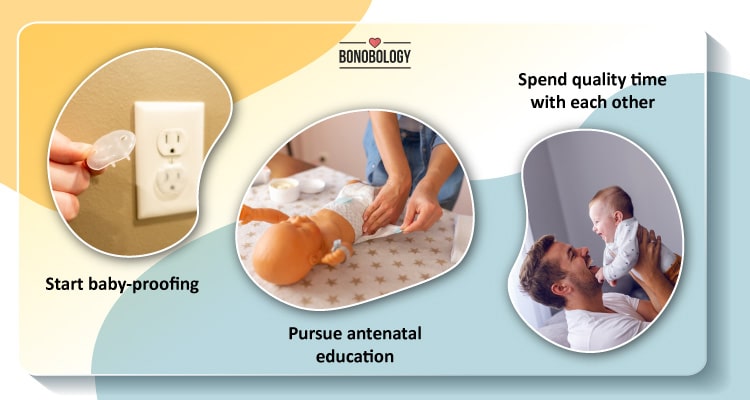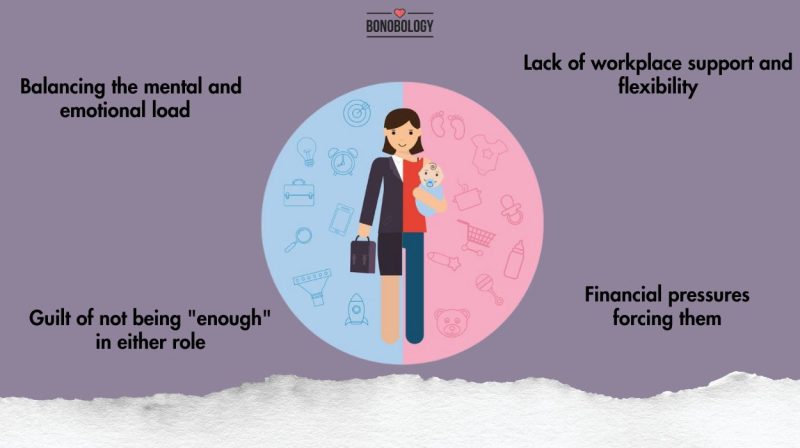“Becoming a father will change your life.” Is this what you keep hearing from everyone around you? Well, they’re all correct in this assumption. While it can be daunting, it can also be the most joyful experience of your life. When you’re preparing for fatherhood, you’ll need a little help, that is for sure!
Coming to terms with the humongous responsibility of caring for a child can be stressful for expectant fathers, but if you prepare in advance, it will reduce the task’s scale and make it seem manageable. And also reduce the stress from your life at the same time. Fatherhood can be a pure joy if you are prepared for it.
So, if you’ve reached this point in your life and are trying to prepare for fatherhood, here are 17 tips to get you ready to become a father. We’ve compiled this list of suggestions in consultation with psychologist Nandita Rambhia, who specializes in CBT, REBT, and couple’s counseling, so make sure you follow through on these tips and you’ll be all set!
Preparing for Fatherhood – 17 Tips To Get You Ready
Table of Contents
Whether you’re ready for a baby or not, becoming a dad is going to be tough. But whether you’re ready or not, your baby is not going to wait. “You need to be ready and prepared for this big, life-altering day that marks the arrival of a tiny human who depends on you for everything,” says Nandita.
Since there is little known about how men prepare for fatherhood, this study aimed to find how the process affects the family dynamics and found that appropriate preparation for fatherhood can potentially enhance maternal, child, and family health, and aid in the baby’s development. So, if you’re going to be a dad, ample preparation is the key.
Whether you’re still in shock by this news or have reached the state of joy that comes with it, finding out you’re going to be a father can be a life-altering moment. As you traverse this path of joy and fear, here are 17 tips for you to keep in mind while you prepare for fatherhood.

1. Prepare Your Mind for the Change
The most important thing dads-to-be need to do is mentally prepare for fatherhood. Fatherhood does not start when your baby arrives in this world. It starts when you realize you’re about to have a baby. That moment is when you become a father of an unborn child and that’s the moment you need to start preparing.
While there are a number of other changes you’ll need to make, the first step is mentally preparing for fatherhood. Understand your life is going to change, things will become chaotic and hectic as you’ll be responsible for another human being. Not just that, there will also be sleep deprivation, your partner will need time to recover from the experience of childbirth, both physically and mentally, and you’ll probably find yourself wondering if you’re doing things right, what if your baby gets hurt, and so on.
Decide upon ways that you can cope with the stress that comes with a baby’s arrival. Some ways that might help take care of your mental health:
- Journaling
- Meditation
- Set up a self-care routine
- Spend some time in nature every day
- Practice gratitude
- Set a disciplined sleeping schedule
2. Start Baby-Proofing
Fatherhood starts well before the baby’s arrival. While we’ve told you how to prepare yourself mentally, there are many other preparations you need to make before the baby arrives. The first few weeks are going to be very hectic. A little thoughtful planning will go a long way here – this is one of the most vital tips for dads waiting for their bundle of joy to arrive.
Once you have a due date for the baby’s arrival, start to make little changes around the house. Before the baby arrives, you need to ensure your house is safe for a newborn baby to be in. So, start baby-proofing now and you’ll avoid this major stress later. Some things to take care of:
- Complete any pending DIY projects around the house
- Ensure no sharp objects are lying around
- If something needs to be repaired, repair it now
Once your baby starts to move about, you’ll need to ensure anything that could cause harm to the baby is well out of reach. Be very careful while baby-proofing as it is a crucial aspect of preparing for fatherhood.
Related Reading: How Being A Father Changed My Life For The Better
3. Take Help From Books
There is no denying that your lives will change after a baby. As a first-time dad, things are going to be hard to manage. So, before the baby’s arrival, brush up on all the knowledge you can. Literature is a great tool in your fatherhood arsenal, so ensure you use it well.
If you’re wishing you could get your hands on a dad guide to help you on this journey, you need to turn to books. Read as many parenting books as you can. If you want some suggestions, here are some of the best books for expecting dads:
- The Expectant Father: The Ultimate Guide for Dads-to-Be by Armin A. Brott
- From Dude to Dad: The Diaper Dude Guide to Pregnancy by Chris Pegula
- Home Game: An Accidental Guide to Fatherhood by Michael Lewis
4. Help Your Partner
According to a study, fathers are secondary parents. Accept the fact that during the early months, the mother will be the primary caregiver. This means that you need to be prepared to do whatever is necessary to support her.
Taking care of your partner should be the most important thing on your mind. She is going to be the one carrying the child to term and this comes with its own challenges eg. postpartum depression. Remember to be physically present with your partner as well as support her mentally.
Nandita suggests being loving, caring, and empathetic toward your partner. “Do your best to see to it that she is in good health and spirits throughout her pregnancy as the mother’s mood directly impacts the baby’s personality,” she says. So, take care of your wife and see to it that she is as well-prepared and healthy as possible.
Related Reading: 7 Ways To Get The Romance Back After Having A Baby
5. Pursue Antenatal Education
Parents’ experiences of the early days of parenthood are affected by the information they receive before birth. Thus, instilling a sense of security and confidence in themselves becomes important during the first postnatal week. This sense of security should be established for parents as individuals, and as a couple for their and the baby’s well-being.
When preparing for the baby’s arrival, new parents tend to do everything together. This study, however, suggests that both the mother and father should pursue antenatal education on their own. It says that new parents tend to consume the same information, but they should also focus on individual experiences. Being educated as a team and individually are equally important. This will help strengthen them as individual parents, as well as stay a team. It is important to go through all the stages of parenthood individually and together.
6. Find a Trustworthy Source of Help
A study suggests that a father’s sense of security plays a vital role in the well-being of the child, the mother, and himself. So, it is crucial to find a trustworthy, competent, and always-available source of help and advice. This will have a positive impact on the father’s sense of security and help the new parents out as well.
“Meet up with colleagues, peers, and friends who’re fathers and get as much practical information as you can from them,” advises Nandita. You can also take help from your own dad, and other family members and ask them how they coped with this change.
7. Prepare an Action Plan
The baby’s arrival is a stressful yet joyous occasion. Both you and your partner need to be as prepared as possible to make the birth experience easy. Several critical tasks need to be taken care of on the delivery day. So, one of the most practical tips for dads is to prepare a plan of action for the delivery day.

A little thoughtful planning will help here. Prepare for the due date well in advance. These are the steps you need to take:
- Store and organize important information. Ensure you have the doctor’s or midwife’s name and number, the birth center number, and contact details for people on standby. Keep this list handy
- Prepare a hospital bag and put all the necessary things in it. Keep the medical records in it as well to avoid any hassle on the due date
- Prepare a list of questions for your medical provider and ask them on the first appointment itself. Labor knowledge will come in handy at the last minute
- Learn how to perform important tasks like changing diapers, installing the infant car seat, etc
Related Reading: Romantic Ways to Keep Relationship Alive After Baby
8. Make Arrangements at Work
Gaining a clear understanding of how fatherhood will affect your professional life is a part of preparing for fatherhood. Once you’ve received the approximate due date from the doctor, make appropriate arrangements at work. Inform your colleagues that you will soon be taking off from work since your partner will need your help. Creating a work-life balance would mean a whole lot more now.
The pre-baby time is hard, but the time after the baby’s arrival can be even harder. So, ensure you’re around to help your partner. The first few weeks are also crucial since you will build your bond with the baby at this time. To be able to do this, you need to spend quality time with your baby and spend enough family time together.
So, make the appropriate arrangements at work and spend your family time in peace. Talk to your employer and figure out all the details. Discuss how you plan to manage your workload, how many days off you will need, and so on.
9. Join Local Support Groups
As a dad-to-be, you’re bound to feel frantic and stressed as the baby’s arrival comes near. The stress is bound to affect fathers to the extent that it makes it hard to function properly. It is important to find support in relationships outside of parenthood in times like this.
To cope with this new responsibility, you need support. Apart from reading the best books for expecting dads, you should also consider joining local support groups. Talking to other dads or other expectant fathers will help put things into perspective. There will be other groups as well like infant first-aid groups, baby yoga, postnatal and prenatal exercise groups, etc.
Remember, there is always strength in numbers! So, these groups will also improve your knowledge and put you in touch with others who are in the same situation as you.
10. Prepare the Baby’s Room
Part of preparing for fatherhood during pregnancy is preparing your baby’s room. A newborn’s stuff can take up a lot of room, and it’s best to have a designated place for it so that you don’t end up cluttering the entire house. Besides, if you don’t plan on co-sleeping, getting the baby to sleep in their own room right from the get-go is essential for habit building.
Preparing to welcome a new baby means taking care of all these aspects before the baby’s arrival. You need to dedicate some to completing the baby’s room, installing baby furniture – crib, changing table, etc –, and stocking it up with all the essentials. Try to have it complete by the 32nd week and you will have ample time to review the other things to prepare for the birth.
11. Spend Quality Time With Each Other
Once the baby arrives, you’re going to be surrounded by chaos and madness, at least for the first few months. When you’re caring for a new baby, you need to ensure you’re both on the same team. And once you get busy with child care, you might not get the time to do much else.
“To ensure your romantic relationship doesn’t suffer too much, spend some time together before the baby is born. Try to maintain physical contact and work on maintaining a great relationship with each other. This will help build a bond with the baby as well,” advises Nandita.
Related Reading: Solutions To 10 Relationship Problems After Having A Baby
12. Plan out the new family budget
Apart from mentally preparing for fatherhood, you also need to work on the practical aspects of adding a new member to the family, such as finances. Right from the hospital bill down to every little thing your child is going to need. These might not look to be too much right now, but these small costs add up over time.
Not everyone pays enough attention to planning their family budget. Don’t make this mistake. Plan ahead and keep in mind how your family budget is going to accommodate these new expenses. Plan ahead and factor in diaper costs, creams, wipes, crib sheets, etc. Planning ahead means you won’t be caught unawares and these costs will not sting unnecessarily.
13. Decide your parenting style
So you’re going to be a dad, and are working toward figuring out how to be a good father. One essential part of this process is deciding on the kind of father you want to be from the get-go. You can take inspiration from your own dad (if you have a great relationship with him), or other dads around you to find the style that suits you the best.
Being a good role model for your child is crucial, and good parenting skills go a long way in helping you get there. Be there when your child needs you, but don’t be extremely lenient or over-pamper them. Try to be a balanced parent, be assertive, yet friendly. Be kind, and approach things not with a lack of empathy but with understanding and you will be a great father.

14. Learn how to support your child when they grow up
The answer to how to be a good father lies in understanding that your role as a support system and a guiding light for your child will continue even when your baby is grown up. One way to do this is to support your child’s curious nature. As Nandita says, “Children are the most curious people in the world.”
The “why” at the end of every sentence can certainly drive you crazy at times but don’t try to shut them down or give them wrong answers. If you don’t have an answer, tell them you’ll search and tell them later. Create a positive and nurturing environment for your child. Clear communication in relationships is vital, and even more so when you’re dealing with a little person who is gonna idolize you.
That can only happen when you’re positive and nurturing as parents and hold a physically safe space for your child. “Try to build positive and proactive relationships with your child and each other and look for ways to bring fun and laughter into your family dynamics,” adds Nandita.
15. Get fit and healthy
Getting in good physical shape is part of becoming a good father. Once the baby is here, you will not get as much time to take care of yourself as you did before. And while fatherhood is pure joy, it is also stressful. To overcome the potential of fatigue while taking care of a baby, you need to be fit. If there are a few extra pounds you need to lose, now is your time to do it.
You’re going to be a dad soon, and this new responsibility is going to eat into your time. So, look for workout routines that are shorter in duration but comprise effective exercises. And ensure you’re fit enough to run around since your partner will need some time to recover from the experience of childbirth.
Related Reading: The Art Of Seduction After A Baby
16. Get the baby gear and equipment
One of the most important tips for dads is to choose the baby gear and equipment well in advance. When you walk into a baby store, you’re likely to feel overwhelmed by the sheer number of choices. The wide variety and selection are enough to make even seasoned fathers quiver in fear.
All of these items are not essential, you only need a few necessities. So, here’s a list of the essentials every first-time dad needs in terms of baby gear and baby furniture:
- Crib
- Infant car seat
- Changing table
- Diaper pail
- Baby bathtub
When choosing a crib, look for one that meets every safety standard possible. Aside from these things, you can just keep buying new baby gear as you need it.
17. Don’t stress too much about being a good father
In her book, Making Sense of Fatherhood, Tina Miller states that the labels of a good and bad father keep on evolving. These are subject to constant change and this makes it difficult for men to keep up with these ever-changing standards of being a good father.
Nandita suggests, “Don’t stress yourself out, don’t get anxious, just remember, fatherhood is one hell of a rollercoaster ride. But, you’re going to love every bit of it.” Don’t worry so much about being the perfect father.
Soon-to-be dads tend to focus too much on preparing to be perfect fathers, it takes a toll on them and could lead to mental health issues. This affects fathers and ultimately, their parenting skills. So, take it easy and enjoy the experience. This is perhaps the most valuable piece of advice on preparing for fatherhood during pregnancy. The baby’s arrival is a joyful occasion, treat it as one!
FAQs
1. How can I manage the financial aspects of becoming a father?
Create a budget that includes baby-related expenses, such as medical costs, baby gear, and childcare. Consider starting a savings account specifically for these expenses.
2 .What should I know about newborn care?
Learn the basics of feeding, diapering, bathing, and soothing a newborn. Take a newborn care class if available, and don’t hesitate to ask for help from healthcare professionals or experienced parents.
3. What if I feel overwhelmed or anxious about becoming a father?
It’s normal to feel anxious. Talk to your partner, join a support group for new fathers, and seek advice from healthcare professionals. Don’t hesitate to ask for help when needed.
Key Pointers
- So you’re going to be a dad soon, it’s a joyous life event! Treat it as such. Enjoy the ride fully and have fun
- Accept there will be many changes in life once the baby arrives. For example, your sex life may become non-existent for the first few months after the baby’s arrival, the parenting load may interfere with your romantic relationship, and you may find yourself pressed for time
- Ensure you get enough sleep and some personal time. Being a parent is hard so don’t let it take a toll on your mental health
- Coping with the changes can be hard for first-time parents. Take help from extended family and friends and you’ll feel a little less overwhelmed
In all honesty, no one is ever completely ready to become a father. Becoming a parent is one of those things in life that can stress you out easily. But if you’re prepared for it well in advance, you’re going to find the task to be a little easier. If you’re preparing to become a father, make use of this list to prepare for the exciting, exhilarating, yet exhausting months that are going to follow. But, don’t forget to enjoy the experience!
Conclusion
Embracing fatherhood is a transformative journey that requires preparation and adaptability. While the prospect can be overwhelming, it is also incredibly rewarding. By mentally preparing, baby-proofing the home, seeking knowledge from books, supporting your partner, pursuing antenatal education, and joining local support groups, you can navigate this new phase with confidence. Remember, there’s no perfect way to be a father; it’s about being present, supportive, and enjoying the journey. With the right preparation and mindset, you can create a nurturing environment for your child and family.
Your contribution does not constitute a charitable donation. It will allow Bonobology to continue bringing you new and up-to-date information in our pursuit of helping anyone in the world to learn how to do anything.




















Featured
11 Signs Of Unsupportive Husband During Pregnancy
My Girlfriend Is Pregnant — What Should I Do And How?
Loss Of A Child: Can Couples Grieve And Heal Together?
12 Tips To Be A Successful Single Mother
Solutions To 10 Relationship Problems After Having A Baby
Childfree By Choice – 15 Awesome Reasons Not To Have Kids
5 Situations When We Ask Our Children to Take Sides but We Shouldn’t…
Worst Parenting Mistakes We Always Make And Should Immediately Correct
5 Ways Our Married Life Changed After A Baby
Here’s how Indian parents react to their daughter’s guy friends
Let’s make a baby: A man’s and a woman’s point of view
6 Stages Of Parenthood: Find Out Which Stage You Are In Now!
What is it like for a Married Couple Not To Have Kids?
Here is a list of ways to deal with societal pressure to get pregnant
How To Keep Relationship Alive After A Baby?
Tips For Finding ‘Me Time’ As A Mom
Motherhood or Career? Women’s Struggle Between Career and Family